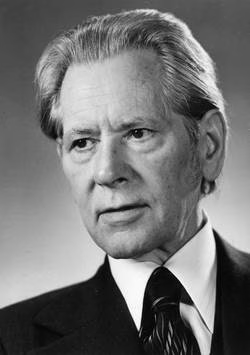Walter-Markov-Prize
Walter-Markov-PrizeThe call for applications for the Walter-Markov-Prize 2025 has been closed, the recipient(s) will be announced at the eighth ENIUGH congress taking place at Linneaus University, Växjö, Sweden, 10-12 September 2025.
The Prize
As a network of historians and their colleagues from neighbouring disciplines, ENIUGH continues a long tradition of studies on the past’s transnational and global dimensions. In order to foster and to refresh this tradition, ENIUGH awards the Walter-Markov-Prize – endowed with € 1,500 – for an outstanding master’s or PhD thesis.
The prize honours an outstanding thesis that contributes to the research fields of Walter Markov: the comparative exploration of revolutions; social movements and decolonisation processes in Africa, Asia, and Latin America; historiographical traditions in various national contexts; and academic internationalisation in the course of the 20th century. The successful applicant will receive € 1,500 as support for the publication of his/her master’s or doctoral thesis.
Walter Markov (Photo courtesy of the Archive of the Leipzig University, N0 4964)
Walter Markov (1909–1993) was a historian whose life and thinking was influenced by the shattered German past. In trying to integrate his experiences of National Socialism, his decade-long imprisonment in a state penitentiary under the Third Reich, and the following Cold War which he looked at from the Eastern side, his works sought to integrate the intellectual potentials of the historical thinking of Karl Marx and impulses from French social history around the Annales school.
Markov’s way of addressing history can be best described as “history from below”. Examining revolutions and revolutionary moments in history, he became one of the most important German historians working on the French Revolution. In continuing the Leipzig tradition in world and global history, initiated by Karl Lamprecht and the Institute for Cultural and Universal History, Markov became the director of this institute in 1949 and tried to bring all area studies at his university under one roof for comparative studies. Pursuing international cooperation with scholars on the other side of the iron curtain – especially with scholars from Latin America, Africa (where he was the first German guest professor), and Asia – he hoped to stand against any withdrawal of his university from border-crossing dialogue and mutual learning.
Previous Prize Winners
- Kim Sebastian Todzi (2023): Der Woermann-Konzern und der deutsche Kolonialismus, 1837-1916 (The Woermann Company and German Colonialism, 1837-1916)
- Immanuel Harisch (2023): Great Hopes, False Promises. African Trade Unions in the World of Organized Labor. Institutions, Networks, and Mobilities during the Cold War 1950s and 1960s
- Andreas Greiner (2021): Tensions of transport. Human porterage and state formation in colonial East Africa, c. 1890–1914
- Siga Maguiraga (2021): Les étudiants maliens en Turquie de 2006 a nos hours : Mobilité et trajectoires socio-éducatives des jeunes ouest-africains
- Eric Burton (2019): Tansanias ‘Afrikanischer Sozialismus’ und die Entwicklungspolitik der beiden deutschen Staaten: Akteure, Beziehungen und Handlungsspielräume, 1961-1990 (further info)
- Johanna Wolf (2017): “Assurances of Friendship”. Metallgewerkschafter während der Globalisierungsprozesse der langen 1970er-Jahre am Beispiel der Schiffbauindustrie
- Lukas Schemper (2017): Humanity Unprepared: International Organization and the Management of Natural Disaster (1921-1991)
- Katja Naumann (2013): Laboratorien der Weltgeschichtsschreibung. Lehre und Forschung an den Universitäten Chicago, Columbia und Harvard 1918 bis 1968
- Christoph Kalter (2011): Die Entdeckung der Dritten Welt und die neue radikale Linke in Frankreich
- Friedemann Pestel (2009): Weimar als Exil. Erfahrungsräume französischer Revolutionsemigranten 1792–1803
- Astrid Windus (2003): Afroargentinier und Nation. Konstruktionsweisen afroargentinischer Identität im Buenos Aires des 19. Jahrhunderts
- Oliver B. Hemmerle (2001): ‘Der arme Teufel’ – Eine transatlantische Zeitschrift zwischen Arbeiterbewegung und bildungsbürgerlichem Kulturtransfer um 1900
- Ludger Wimmelbücker (2001): The Kilimanjaro Region. Production and Living Conditions, c. 1800–1920
- Knuth Matthias Dethlefsen (1999): British Presence and Rule in China between 1919–1937
- Christian Koller (1999): Von Wilden aller Rassen niedergemetzelt. Die Diskussion um die Verwendung von Kolonialtruppen in Europa zwischen Rassismus, Kolonial- und Militärpolitik 1914–1930
- Thomas Erdmann Fischer (1997): Geschichte der Geschichtskultur. Über den öffentlichen Gebrauch der Vergangenheit von den antiken Kulturen bis zur Gegenwart
- Norbert Kersken (1994): Geschichtsschreibung im Europa der Nationes. Nationalgeschichtliche Gesamtdarstellungen im Mittelalter
Previous Honorary Distinctions
- Ruth Ennis (2023): The “Migrant” and her “Trafficker”: European Empire, a Metaphor and the Law (1866-1881)
- Michael Rösser (2023): Prisms of Work – Labour, Recruitment and Command in German East Africa”
- Camila A. Varela (2023): The Rise of the Fourth World: The World Council of Indigenous Peoples, the Third World, and a Challenge of Anticolonialisms
- Isaak van Dijke (2021): The Tielman Brothers as Wanderer ohne Ziel. A
Postcolonial Perspective on the Rise, Reception and Demise of Indorock - Ismay Milford (2021): Harnessing the Wind: East and Central African Activists and Anticolognial Cultures in a Decolonizing World, 1952–1964
- Annabel Ruckdeschel (2021): „Montparnasse, carrefour du monde“. Die
Erfindung von Paris als Kunstzentrum – von den Café-Ausstellungen in
Montparnasse zu den internationalen Ausstellungen der „École de
Paris“, 1921–1946




